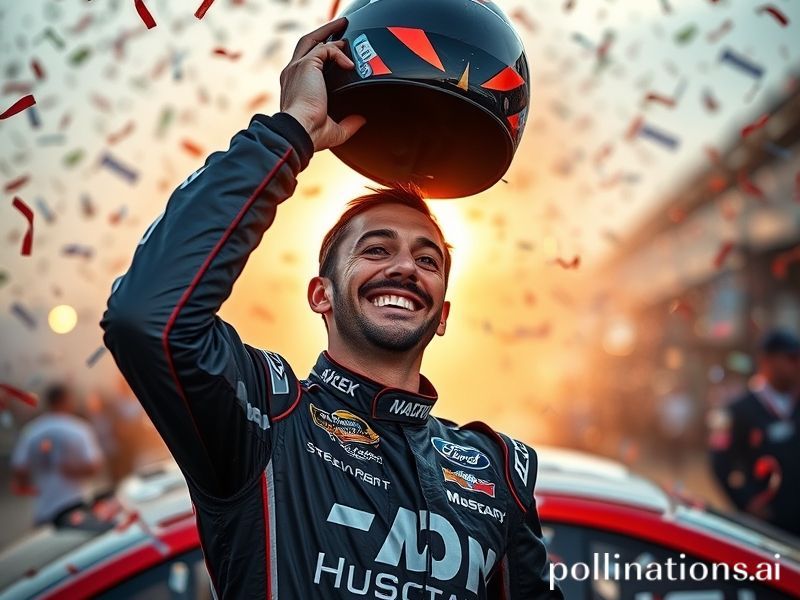From Mariel to Martinsville: How Aric Almirola’s NASCAR Career Explains the Absurdity of the Modern World
Aric Almirola: The Cuban-American Whose 200-mph Commute Became a Global Parable
By the time Aric Almirola eased his No. 10 Stewart-Haas Ford into retirement at the end of last season, he had logged exactly 460 starts in NASCAR’s top flight—roughly the distance from Havana to Pyongyang if you could drive on water and had a death wish. To most of the planet, which treats stock-car racing with the same indifference it reserves for American cheese, that statistic sounds like a typo. Yet Almirola’s quiet exit is instructive, a tidy morality play about identity, late capitalism, and the universal human urge to monetize one’s own childhood trauma.
Born on Eglin Air Force Base in Florida to parents who fled Cuba two years earlier on the Mariel boatlift, Almirola entered the world with the geopolitical equivalent of nitrous oxide in his bloodstream. Fidel Castro had used the exodus to empty his jails; Ronald Reagan welcomed the refugees with open arms and a photo-op. Somewhere in that transactional embrace sat an infant who would grow up to wear corporate patches for Smithfield Foods and Haas Automation—proof that exile, like everything else, eventually becomes a branding opportunity.
A decade ago, European observers dismissed NASCAR as obese cars turning left for people who think Bordeaux is a color. But Almirola’s career arc tracks disturbingly well with the global drift toward nationalist technopopulism. While he was winning at Talladega in 2018, Hungary was sealing its borders, Brexit was metastasizing, and Brazilian truckers were blockading highways to protest fuel prices. The world, it seemed, was also stuck on an oval, burning rubber and going nowhere. Almirola’s post-race invocation of “the American dream” played like elevator music in a burning mall.
The international press corps prefers its Latino athletes to come with either a redemption narrative or a left-wing manifesto. Almirola offered neither. Instead, he provided the more unsettling spectacle of a man who succeeded by mastering the rules of a system designed to chew him up—then smiling politely while thanking his crew chief, his sponsors, and, for all we know, the Dow Chemical Company. It was assimilation as performance art, delivered at 1.5-second pit-stop speed.
Consider the sponsorship calculus: Smithfield, a Chinese-owned pork conglomerate, bankrolled Almirola’s seat in exchange for advertising space measured in square inches on a car that weighs 3,200 pounds and still can’t get decent mileage. Somewhere in Beijing, an accountant once had to justify that line item to a Communist Party cadre who thinks Daytona is a kind of fish. The absurdity is so multilayered it approaches poetry, if poetry were written by MBA interns on deadline.
Meanwhile, the geopolitical ripples keep spreading. When Almirola announced he’d step away to spend more time with his family, the news ping-ponged from ESPN to the Gulf Times, where it nestled between headlines on OPEC quotas and the latest FIFA indictment. A Cuban-American driver quitting an American motorsport funded by Chinese pork money merited exactly 73 words—precisely the attention span the world now grants any story that isn’t accompanied by an airstrike or a celebrity divorce.
Which brings us to the broader significance: Almirola’s career is a masterclass in how late-stage capitalism digests even the most combustible personal histories and extrudes them as content. The roar of 40 engines at Daytona is indistinguishable from the roar of 40 million notifications on a smartphone: both are designed to drown out the small, unsettling voice that asks whether any of this was worth the fuel.
Yet there’s something almost heroic in the man’s refusal to pretend otherwise. In interviews, Almirola displayed the weary clarity of someone who knows the game is rigged but plays anyway—because the alternative is admitting the game was always pointless. That, too, is universal. From Havana to Hanoi, humans strap themselves into machines that promise velocity while delivering only circles.
In the end, Aric Almirola didn’t change the world; he merely illustrated it, one lap at a time. The checkered flag drops, the engines cool, and the grandstands empty into parking lots named after banks. Somewhere, a child in another country dreams of escape velocity, unaware that orbit is just a higher circle. The world keeps turning left.







